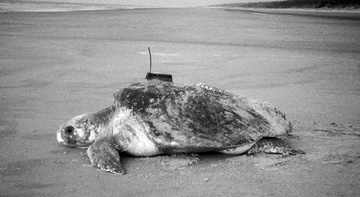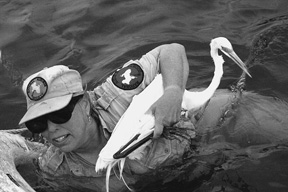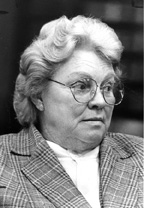

 |
||||||
 |
||||||

Loggerhead Turtle Nests Decline by Nearly 40%
Loggerhead sea turtle nests in Florida declined by nearly 40% between 1998 and 2005, according to data collected as part of the Florida Fish and Wildlife Conservation Commission’s Index Nesting Beach Survey. The latest decline continues a trend first documented in 1989, with a total decrease of 22.3% over the 17-year period.
 |
|
Photo courtesy of NOAA |
Florida accounts for more than 90% of the loggerhead nesting in the U.S. and a preliminary assessment of data from the 2006 season suggests another poor year for loggerheads,with the second lowest nesting in the history of the survey.
Loggerhead strandings (dead or debilitated turtles) also have increased significantly from 1989 through 2005, with the two highest yearly totals occurring in 2003 and 2005. Multiple threats impact sea turtle populations, ranging from loss of beach habitat and artificial lighting that causes hatchlings to crawl inland rather than toward the water to boat collisions, commercial fishing activities, red tide and a fatal disease related to the human herpes virus.
“Dead Zones” Rise by 30%, UN Cites Fertilizer, Fuel
The number of oxygen-starved “dead zones” in the world’s seas and oceans has risen more than a third over the past two years because of fertilizer, sewage, animal waste and emissions from burning fossil fuels, according to the United Nations Environment Program.
The number of global dead zones increased from 150 to 200, the UNEP said. The oxygen-depleted zones are created when high levels of nutrients fuel the explosive growth of algae that then die and sink to the bottom where they are eaten by bacteria that consume available oxygen. “These areas are fast becoming major threats to fish stocks and thus to the people who depend upon fisheries for food and livelihoods,” UNEP experts warn.
In the US, the most well-known dead zones are at the mouth of the Mississippi River, which drains the rich farmlands of the Midwest, and in the Chesapeake Bay. Worldwide, dead zones can be found in the Baltic Sea, Archipelago Sea, Fosu Lagoon near Ghana, the Pearl River estuary and Changjiang River in China, Britain’s Mersey River estuary, and Elefsis Bay and the Aegean Sea near Greece.
The UN predicts a 14% increase in the amount of nutrients delivered to oceans from rivers from the mid-1990s through 2030.
Asian Green Mussels Spotted in South Carolina
Invasive Asian green mussels (Perna viridis), first found in the US clogging intake pipes at TECO’s Big Bend power plant in 1999, are on the move. The mussel, which can grow to six inches, apparently hitchhiked to Tampa Bay in ballast water and has become a common sight below the waterline on bay area bridges and docks.
Sightings have expanded, moving south from Tampa Bay initially, with populations found in northeast Florida in 2002 and multiple observations across coastal Georgia since 2003. Last summer, biologists in South Carolina discovered hundreds of dead shells of the green mussel in water supply lines that had been shut down to kill fouling organisms.
FPL Plans Power Plant Near Everglades
Citing the demands of 100,000 new customers per year, Florida Power & Light is planning to build a 1960-megawatt coal-fired power plant northwest of Moore Haven, at the edge of the Florida Everglades. The new plant, expected to go online in 2012, will serve approximately 650,000 homes. The proposed plant would use ultra supercritical coal technology that produces steam at very high temperatures and pressures, resulting in higher efficiency and fewer emissions. Pollution control equipment will help ensure that the facility meets or exceeds environmental protection requirements, the company said. Mercury emissions are expected to be at least 30% less than allowed.
Opposition to the proposed plant is mounting from groups citing concerns about the threat of carbon dioxide (greenhouse gas) emissions and mercury contamination in waterways from coal-fired power plants.
Port Manatee, Richard Smith Earn EPA Gulf Guardian Awards
Port Manatee’s seagrass and ecosystem improvement projects have been recognized with a Gulf Guardian Award in the business category from the Environmental Protection Agency’s Gulf of Mexico Program.
The project, which took more than three years to complete, includes transforming a 60-acre man-made island into a thriving seabird nesting site, restoring 30 acres of seagrass and protecting another 300 acres of seagrasses. The island, known as Manbirtee Key, hosts more than 82 species of birds, according to Audubon of Florida. Partners including Manatee County Port Authority, Gulfstream Natural Gas System, Gee and Jenson, Audubon of Florida, Lewis Environmental Services, Environmental Affairs Consultants and other businesses and organizations, helped rid the island of predators and invasive vegetation to create a heavily used seabird nesting area.
Richard Smith, a teacher at Kinnan Elementary School in Sarasota and volunteer coordinator for Creative Environmental Education, won the second-place award in the individual category. Creator of the Reef Rakers and Bay Buddies program, Smith is recognized as one of the most creative educators in the state. He and his students are included in the state’s new seventh-grade science textbook and he has a local television show where students demonstrate scientific principles.
The Gulf of Mexico Program received nearly 70 nominations for its Gulf Guardian awards from Texas, Louisiana, Mississippi, Alabama and Florida.
“Down the Suwannee River” with National Geographic
National Geographic takes a critical look at the Suwannee River – the only undisturbed major river system in the southeastern United States – and warns that growing populations surrounding the river may change that.
“It’s kind of an oasis that’s now surrounded by extensive development on all sides,” Brian Katz, a hydrologist with the US Geological Survey in Tallahassee, told the publication. Along with the growing demand for fresh water, scientists are concerned about increased levels of nutrients, particularly from septic tanks. Managers recently issued a water shortage advisory and asked users to reduce consumption after water levels dropped to less than half of the minimum flow recommended by the Suwannee River Water Management District.
Along with the article (available online at http://news.nationalgeographic.com/news/2 006/11/061121-florida-water.html), a special section on the Suwannee River Wilderness Trail details recreational opportunities along the 170-mile river as it flows from the Okefenokee Swamp to the Suwannee estuary just north of Cedar Key.
Bird Island Purchased for Preservation
 |
|
Ann Paul, manager of Audubon’s Florida Coastal Islands Sanctuaries, rescued a great egret trapped in monofilament line from Bird Island last summer. Photo by Holly Greening |
Bird Island – aka Coffee Pot Island in St. Petersburg’s Coffee Pot Bayou – has been purchased by a private corporation for use as a nature preserve. One of the most important urban rookeries in the region, it hosted 482 pairs of breeding birds including six species of special concern in 2006, according to the Audubon Society.
Clearwater developer Chris Scherer had an option to purchase the island and a drawing with four solar-powered stilt homes had been submitted to the city last year. In October, the St. Petersburg City Council gave the island preservation status and Bird Island LLC paid the long-time owners $60,000 in December to purchase the 2.8- acre island.
IN MEMORIAM: Wilson-Grizzle
 |
|
Harold Wilson (1972) |
 |
|
Mary Grizzle (1988) |
|
Photos courtesy The Tampa Tribune |
Two legislators forever linked in the history of Tampa Bay both died in late 2006. State Senators Harold Wilson and Mary Grizzle sponsored the legislation that led the city of Tampa to rebuild its bayside sewage treatment plant to achieve advanced wastewater treatment (AWT) standards, an action generally credited with starting Tampa Bay’s remarkable turnaround.
A graduate of Harvard Law School, Wilson moved to Clearwater in 1959 and served as a Republican state senator from 1966 to 1972. A strong proponent of clean water, he has been quoted as saying “when we talk about purifying the water, we really mean business.”
Wilson, who died on October 20 at the age of 85, is survived by his wife, Mary Ellen, two daughters and a grandson.
Grizzle, the first Republican woman elected to the Florida Legislature, was an Ohio farm girl and a champion of the environment “long before ecology became a household word,” as she once said. Along with her 1972 co-sponsorship of the Wilson- Grizzle Act, she worked with Mary Figg to pass the Grizzle-Figg Act mandating advanced wastewater treatment for discharges in Tampa Bay, making it almost clean enough to drink.
“I think other regions of the state were always somewhat envious of what we managed to accomplish in Tampa Bay,” Figg said. “Mary’s legacy was her work as a solid legislator who always had the best interest of the local community in mind.”
Grizzle, who died on Nov. 9, also was 85. She is survived by a son, five daughters, two sisters and four grandchildren.
